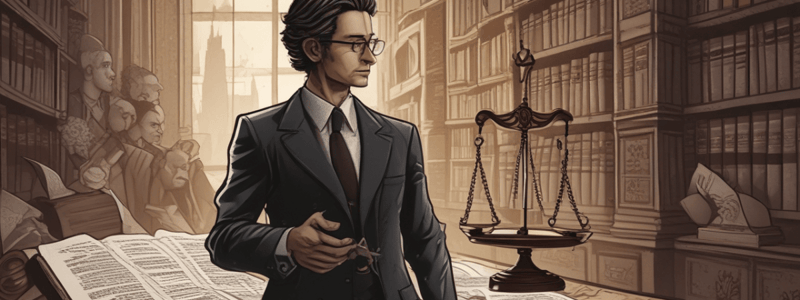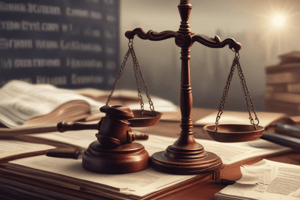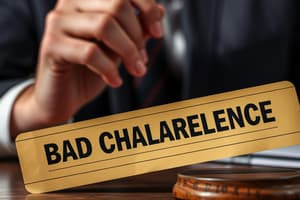Podcast
Questions and Answers
What is the primary goal of a trial in an adversarial system?
What is the primary goal of a trial in an adversarial system?
- To establish the ultimate truth of past events
- To determine the most acceptable probability of what occurred (correct)
- To punish the accused
- To prove the innocence of the defendant
What is the role of the parties in an adversarial trial?
What is the role of the parties in an adversarial trial?
- To decide what evidence to present and what to prevent from being presented (correct)
- To present evidence in a neutral and impartial manner
- To persuade the judge to make a decision
- To work together to find the truth
What is the purpose of evidence in a trial?
What is the purpose of evidence in a trial?
- To establish the ultimate truth of past events
- To persuade the jury to make a decision
- To change a fact-finder's belief with respect to a factual proposition (correct)
- To prove the innocence of the defendant
What is the difference between an open question and a leading question?
What is the difference between an open question and a leading question?
What is the role of the judge in relation to evidence and questions?
What is the role of the judge in relation to evidence and questions?
What is the primary consideration when deciding whether to introduce evidence at a trial?
What is the primary consideration when deciding whether to introduce evidence at a trial?
What are the three specific issues revolving around the general questions of excluding evidence from trial?
What are the three specific issues revolving around the general questions of excluding evidence from trial?
What is direct evidence?
What is direct evidence?
What is a collateral fact?
What is a collateral fact?
What is the role of the trier of law in a trial?
What is the role of the trier of law in a trial?
Why is there a general ban on hearsay evidence in jury trials?
Why is there a general ban on hearsay evidence in jury trials?
What is the purpose of the 'voir dire' process?
What is the purpose of the 'voir dire' process?
What is the legal burden of proof?
What is the legal burden of proof?
What is the evidential burden of proof?
What is the evidential burden of proof?
What is the significance of the Woolmington v DPP case?
What is the significance of the Woolmington v DPP case?
What is the purpose of exclusionary rules in evidence law?
What is the purpose of exclusionary rules in evidence law?
What is the common law exception where the burden of proof is placed on the defendant?
What is the common law exception where the burden of proof is placed on the defendant?
Why is the burden of proof placed on the defendant in insanity cases?
Why is the burden of proof placed on the defendant in insanity cases?
What is the issue with placing the burden of proof on the defendant in certain cases?
What is the issue with placing the burden of proof on the defendant in certain cases?
What is the approach taken by the House of Lords in cases challenging specific statutory reverse burdens?
What is the approach taken by the House of Lords in cases challenging specific statutory reverse burdens?
What was the outcome of the case R v Lambert?
What was the outcome of the case R v Lambert?
What was the issue in the case of R v Johnstone?
What was the issue in the case of R v Johnstone?
What was the outcome of the case Sheldrake v DPP?
What was the outcome of the case Sheldrake v DPP?
What is the general principle in criminal law that is relevant to these cases?
What is the general principle in criminal law that is relevant to these cases?
What is the relevance of Article 6(2) ECHR to these cases?
What is the relevance of Article 6(2) ECHR to these cases?
What is the effect of reversing the burden of proof in certain cases?
What is the effect of reversing the burden of proof in certain cases?
What is the general rule regarding the burden of proof in relation to implied statutory exceptions?
What is the general rule regarding the burden of proof in relation to implied statutory exceptions?
In R v Hunt, what was the issue that the court had to decide?
In R v Hunt, what was the issue that the court had to decide?
What is the standard of proof required in criminal cases?
What is the standard of proof required in criminal cases?
What is the purpose of examination in chief?
What is the purpose of examination in chief?
What is the key rule regarding examination in chief?
What is the key rule regarding examination in chief?
What is the difference between a hostile witness and an unfavourable witness?
What is the difference between a hostile witness and an unfavourable witness?
What is the role of the judge in the adversarial system?
What is the role of the judge in the adversarial system?
What is the purpose of cross-examination?
What is the purpose of cross-examination?
What is the exception to the rule of no leading questions in examination in chief?
What is the exception to the rule of no leading questions in examination in chief?
What is the burden of proof in cases where the burden is reversed?
What is the burden of proof in cases where the burden is reversed?
What is the purpose of cross-examination in a trial?
What is the purpose of cross-examination in a trial?
What is a key difference between examination in chief and cross-examination?
What is a key difference between examination in chief and cross-examination?
What is the rule in Browne v Dunn?
What is the rule in Browne v Dunn?
What is the 'collateral-finality rule'?
What is the 'collateral-finality rule'?
Why is cross-examination considered a core method of attaining truth in a trial?
Why is cross-examination considered a core method of attaining truth in a trial?
What is the purpose of limiting the scope of cross-examination?
What is the purpose of limiting the scope of cross-examination?
A trial is an objective inquiry into past events.
A trial is an objective inquiry into past events.
Evidence can only be in the form of oral testimony.
Evidence can only be in the form of oral testimony.
The primary goal of a trial is to establish the ultimate truth of past events.
The primary goal of a trial is to establish the ultimate truth of past events.
The judge decides what evidence is acceptable and what is not.
The judge decides what evidence is acceptable and what is not.
Leading questions are allowed in examination in chief.
Leading questions are allowed in examination in chief.
The prosecution and defense work together to present evidence in a trial.
The prosecution and defense work together to present evidence in a trial.
In cross-examination, witnesses can only be asked open questions.
In cross-examination, witnesses can only be asked open questions.
The 'collateral-finality rule' states that a witness's statements on collateral matters can be rebutted with evidence.
The 'collateral-finality rule' states that a witness's statements on collateral matters can be rebutted with evidence.
The primary goal of a trial is to establish the ultimate truth of past events.
The primary goal of a trial is to establish the ultimate truth of past events.
In cross-examination, the scope of questioning is unlimited.
In cross-examination, the scope of questioning is unlimited.
A hostile witness is always a witness who is lying.
A hostile witness is always a witness who is lying.
Cross-examination is a core method of attaining truth in a trial.
Cross-examination is a core method of attaining truth in a trial.
The legal burden of proof is generally on the prosecution in criminal cases.
The legal burden of proof is generally on the prosecution in criminal cases.
The standard of proof in criminal cases is balance of probabilities.
The standard of proof in criminal cases is balance of probabilities.
In R v Hunt, the court ruled that the burden of proof was on the defendant.
In R v Hunt, the court ruled that the burden of proof was on the defendant.
The evidential burden always rests with the prosecution.
The evidential burden always rests with the prosecution.
The judge can examine witnesses in a trial.
The judge can examine witnesses in a trial.
Leading questions are allowed in cross-examination.
Leading questions are allowed in cross-examination.
The standard of proof is the same for both civil and criminal cases.
The standard of proof is the same for both civil and criminal cases.
A hostile witness is one who is not helpful for your case.
A hostile witness is one who is not helpful for your case.
At common law, the defence of insanity places the burden on the prosecution to prove that the defendant is sane.
At common law, the defence of insanity places the burden on the prosecution to prove that the defendant is sane.
There is no distinction between examination in chief and cross-examination.
There is no distinction between examination in chief and cross-examination.
The prosecution retains the legal burden to prove the defendant's guilt in all cases.
The prosecution retains the legal burden to prove the defendant's guilt in all cases.
The Human Rights Act 1998 allows for statutory exceptions to the presumption of innocence.
The Human Rights Act 1998 allows for statutory exceptions to the presumption of innocence.
The case of R v Lambert involved a drug offence where the defendant had to prove they did not know they were in possession of a controlled substance.
The case of R v Lambert involved a drug offence where the defendant had to prove they did not know they were in possession of a controlled substance.
The approach in R v Lambert was adopted in subsequent Court of Appeal decisions, including R v Johnstone.
The approach in R v Lambert was adopted in subsequent Court of Appeal decisions, including R v Johnstone.
In Sheldrake v DPP, the defendant was convicted of being in charge of a motor vehicle while under the influence of alcohol.
In Sheldrake v DPP, the defendant was convicted of being in charge of a motor vehicle while under the influence of alcohol.
Lord Bingham regarded the burden on the defendant as beyond reasonable limits in Sheldrake v DPP.
Lord Bingham regarded the burden on the defendant as beyond reasonable limits in Sheldrake v DPP.
The burden of proof in insanity cases is placed on the prosecution.
The burden of proof in insanity cases is placed on the prosecution.
The presumption of sanity exists in criminal law, meaning that defendants are presumed sane unless proven otherwise.
The presumption of sanity exists in criminal law, meaning that defendants are presumed sane unless proven otherwise.
The House of Lords' approach in R v Lambert involves three steps: establishing infringement, justification, and reading down legislation.
The House of Lords' approach in R v Lambert involves three steps: establishing infringement, justification, and reading down legislation.
Article 6(2) ECHR is relevant to cases involving the reversal of the burden of proof.
Article 6(2) ECHR is relevant to cases involving the reversal of the burden of proof.
The case of R v Johnstone involved a trademark infringement.
The case of R v Johnstone involved a trademark infringement.
Circumstantial evidence can directly prove a fact in issue.
Circumstantial evidence can directly prove a fact in issue.
Testimonial evidence is always oral evidence.
Testimonial evidence is always oral evidence.
A fact in issue is a fact that the defense must prove in criminal proceedings.
A fact in issue is a fact that the defense must prove in criminal proceedings.
Real evidence can be inspected.
Real evidence can be inspected.
The credibility of a witness is a fact in issue.
The credibility of a witness is a fact in issue.
The judge decides the law and the facts in a trial.
The judge decides the law and the facts in a trial.
The burden of proof is always on the prosecution in criminal cases.
The burden of proof is always on the prosecution in criminal cases.
The prosecution has the evidential burden of proving their case from the start of the trial.
The prosecution has the evidential burden of proving their case from the start of the trial.
The defense has the legal burden of proving their case in criminal cases.
The defense has the legal burden of proving their case in criminal cases.
The presumption of innocence is a fundamental principle of English criminal law.
The presumption of innocence is a fundamental principle of English criminal law.
Flashcards are hidden until you start studying
Study Notes
Evidence and Burden of Proof
- Evidence is any material that has the potential to change a fact-finder's belief with respect to any factual proposition that is in dispute and to be decided.
- Evidence can be in many forms, including oral, written, and documentary.
- Types of evidence:
- Direct evidence: determines a fact in issue without further inference.
- Circumstantial evidence: requires inferences to be made.
- Testimonial evidence: oral evidence, such as witness statements in court.
- Real evidence: actual things to be examined, such as physical objects, documents, and the demeanour of the witness.
Adversarial System
- Trials in this country are not objective inquiries into past events, but rather adversarial contests between prosecution and defence.
- It is the party's decision to decide what evidence they wish to present or wish to prevent from being presented.
- The goal is to present evidence in the most persuasive way to win the sympathy of the court for their side and position.
Questioning Witnesses
- Two kinds of examination:
- Examination in chief: examining your own witness to adduce evidence.
- Cross-examination: questioning the other party's witness or hostile witness to elicit evidence or discredit their evidence.
- Rules for questioning:
- No leading questions in examination in chief.
- Leading questions are allowed in cross-examination.
- Exceptions to leading questions include introductory or uncontentious matters, complex subject matter, and hostile witnesses.
Hostile Witnesses
- A hostile witness is one that does not want to tell the truth.
- Determining hostility is a question of law, based on factors such as demeanour, inconsistency in statements, and providing legitimate explanations.
- A hostile witness can be cross-examined.
Cross-Examination
- Aim is to elicit evidence or discredit evidence from the witness.
- Limits on scope of cross-examination:
- Lengthy and irrelevant examination are restricted.
- Questions on creditworthiness must relate to facts in issue.
- Rule in Browne v Dunn: a party must cross-examine on conflicting evidence.
- Collateral-finality rule: witness statements on collateral matters are final.
Burden of Proof
- Legal burden: discharged by proving facts to the trier of fact (i.e. the jury).
- Evidential burden: discharged by raising an issue for the trier of fact to answer.
- General rule: the party with the legal burden has the evidential burden, but with some exceptions.
- Woolmington v DPP: 'it is the duty of the prosecution to prove the prisoner's guilt'.
Standard of Proof
- Criminal standard of proof: beyond a reasonable doubt.
- Key phrases:
- 'if the evidence is so strong...as to leave only a remote possibility in D's favour which can be dismissed with the sentence "of course it is possible, but not in the least probable", the case is proved beyond a reasonable doubt'.
- 'completely satisfied, sure'.
- 'sure as if making important life choices'.
Procedure
- Judge's role: deciding on the admissibility of evidence, directing the jury, and making decisions on the fairness of the trial.
- Jury's role: deciding on the facts of the case.
- 'Voire dire': a trial within a trial, where the judge hears evidence about whether evidence should be admitted.
Exclusionary Rules
- Law of evidence focuses on admissibility, not how factual decisions are made.
- Rules and doctrines operate to exclude certain kinds of evidence in certain contexts.
- Judge's discretion: excluding evidence on the basis of probative value and prejudicial value, or in the interests of fairness.### Cross-Examination
- Refusing to answer questions or saying "I don't remember" is a reason to suspect a hostile witness
- Inconsistencies in statements, whether direct contradictions or not, can also indicate a hostile witness
- The court decides whether a witness is hostile based on these reasons
- A hostile witness can be cross-examined to elicit evidence or discredit their testimony
Key Differences in Cross-Examination
- Can ask leading questions
- Can ask questions to discredit the witness's credibility
Limits of Cross-Examination
- Lengthy and irrelevant examination are restricted
- Questions about creditworthiness must relate to facts in issue, not remote issues
- Rule in Browne v Dunn: a party must cross-examine a witness on conflicting evidence if they wish to reject their testimony
- Collateral-finality rule: witness statements on collateral matters are final, but statements on facts in issue can be rebutted with evidence
Implied Statutory Exceptions
- Implied exceptions can be found where the defendant relies on exceptions, exemptions, provisos, or qualifications
- Legal burden of proof falls on the defendant in such cases
- Example: R v Hunt, where the defendant relied on the Misuse of Drugs Regulations to defend against a drug offense charge
Evidential Burden
- Generally rests with whoever has the legal burden (usually the prosecution)
- Exceptions include general defenses like public/private defense, duress, and automatism, where the defendant has the evidential burden to raise sufficient evidence
Standard of Proof
- Burden refers to who needs to prove, while standard refers to how they need to prove
- Criminal standard of proof is beyond a reasonable doubt
- Examples of satisfied standards: completely satisfied, sure, as if making important life choices
Witness Examination
- Adversarial system: judge does not examine witnesses
- Two types of examination: examination in chief (and re-examination) and cross-examination
- Rules for examination in chief: no leading questions, except in certain circumstances (introductory/uncontentious matters, complex subject matter, witness identification)
- Hostile witnesses: different from unfavorable witnesses; determined by factors like demeanor and refusal to answer questions; can be cross-examined
Studying That Suits You
Use AI to generate personalized quizzes and flashcards to suit your learning preferences.




